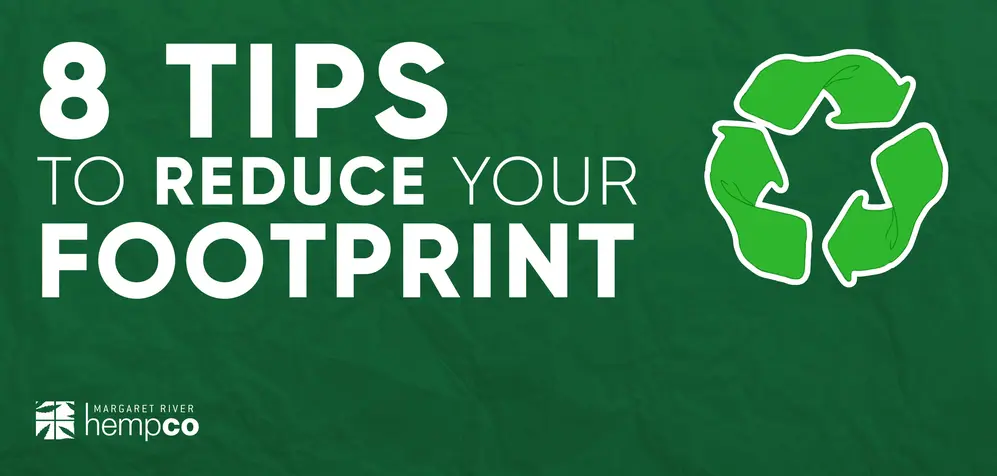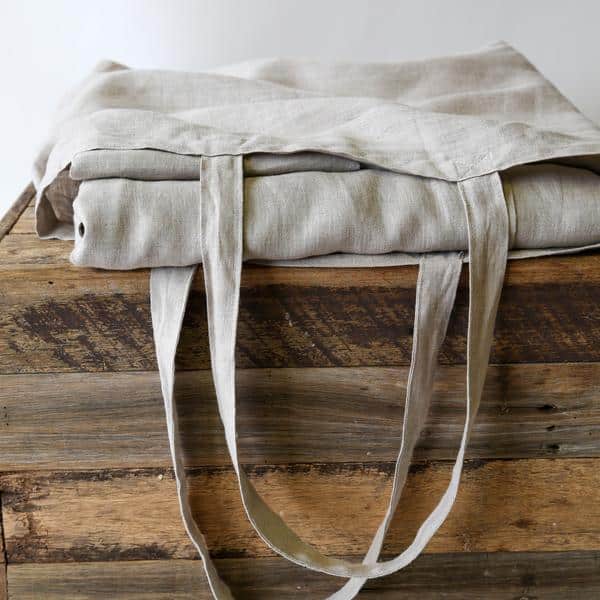
Sustainability has become a concern in recent years, and people are moving towards reducing their footprint at home - to improve the environment and save the earth.
It has become somewhat of a trend to 'Reduce Your Footprint' in the last 5-10 years, mainly because sustainability movements have gained momentum.
People are beginning to care more about how what they use affects the environment.
You can help reduce your waste footprint on the planet by integrating some of the following tips in your life.
While plastic is cheaper to manufacture, it causes pollution due to being made with oil-based materials. Many recycling companies don’t accept common plastics since it’s tough to recycle plastic and litter the environment.
Alternatively, Fabric-based shopping bags are more environmentally friendly and can be recycled. Making them an easy option to reduce your footprint.

Shopping bags made with hemp, cotton, or jute are more durable than plastic and reusable even after they get dirty - you can just wash them to clean stains or remove odours.
You’ll find different packaging types in most stores and are often in the form of plastic - the most commonly used packaging material.
Plastic is used to deliver single-use items to consumers but leads to many problems like litter and atmospheric pollution. It’s also detrimental to your health since the containers can be coated with harmful substances.
Paper, metal, and glass are better packaging options since you can recycle them. While paper is a good choice for storing solid food, it can’t, sadly, hold liquids.
That’s where the glass comes in. Glass is a non-toxic way to keep food, both solid and liquid since it isn’t coated with harmful materials.
Small, simple choices can add up quickly and help reduce your footprint.
Have you noticed how easily a cheap dress you brought gets ruined after just one go? This is the result of fast fashion trends.
Fast fashion has been designed to be affordable, in-style at the moment, and expendable. These cheap clothes are only good for a short amount of time.
Fast fashion also promotes litter, and the manufacturing of clothes increases the carbon content, and also the chemicals used contaminate water.
In the long run, fast fashion is disadvantageous to your finances. By buying high-quality products made with substances like hemp and cotton, you can save money since the product will be reusable and still good as new if you take care of them.
So if you're serious about reducing your footprint, then it's time to become more fashion-conscious.
Single-use packaging has become the norm in shopping centres, but it adds to environmental pollution and littering. Using plastic items to hold things like honey is cheaper, but it adds to wastage since you can’t recycle it.
Instead of buying food items that are contained in a single-use container weekly, you should purchase food items in bulk.
You can buy food in bulk at local grocery shops with bulk sections and farmer markets. You can take reusable containers like glass jars to store dry fruits and a poreless shopping bag for flour and other grains.
Bottled water is convenient when you’re out of the house in a place that doesn’t have water but leads to more waste. Water bottles are usually single-use products made with plastic and so cause a recycling issue in most countries.
Bottled water may have added minerals and essential salts, but harmful chemicals coated onto bottles, usually older bottles, can mix with the water, and the water can even be contaminated.
Tap water, on the other hand, can be boiled or filtered and stored in metal or glass containers. It is cheaper and significantly more environmentally friendly.
Single-use items are items packed in plastic packaging that is only to be used once, and then you throw the packaging away. Such items include plastic straws, plastic wrap, plastic shopping bags, and plastic cups.
Instead of using these items that lead to more waste in oceans and landfills, you should use things that you can reuse many times.
Alternatives include products like glass containers, reusable water bottles, and stainless steel or paper straws. Using items that you can use multiple times helps to save money and promotes sustainable living.
You found a trendy shirt in the shops, and you just had to buy it, so you bought it even though manufacturers made it with poor quality material, which irritates your skin and will be thrown away after a couple of uses.
This is the very definition of impulse buying. You buy something on the get-go and then realise your mistake. The product then ends up being discarded, so buying it was just a waste of money and hurt the planet.
Instead of buying the first thing you like, take a moment to think about whether you need this item or not. Better yet, make a solid budget and stick to it.
When you see something you just can’t live without, give yourself some time to calm your emotions and then decide if you want to buy that item. This will help prevent impulse buying.
Food items like honey, pickled veggies, milk, butter, and even nut-butters are usually stored in plastic containers.
Still, since plastic containers are coated in unhealthy chemicals, they can seep into the food you have stored in the containers.
A safer alternative method is to use glass bottles to hold milk and glass or metal jars to store butter, nuts, and pickles. Glass is also better for the environment, and glass doesn’t retain the smell or odour of foods you keep in it.
Moving towards reusable items, refusing single-use plastics, and avoiding bottled water reduces your footprint on the world. Items made from glass, metal and paper are far more sustainable than plastic and reduce littering.
Have you implemented any of these in your life yet?